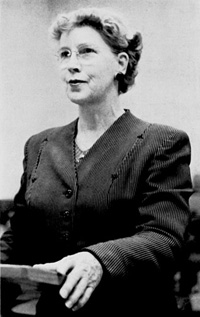Dorothy Richey - Furman Mentors
Back to main
 DOROTHY RICHEY
DOROTHY RICHEY
Speech professor Dorothy Richey was by far my most impressive influence at Furman in the 1950s.
She was a smallish, rather intense woman with wire-frame glasses perched on her nose. She had a patient, precise, rather formal speaking voice, with every word deliberately selected, and a half-pursed mouth that always seemed on the verge of primly stifled laughter. A cruelly twisted hand had ended her professional acting career.
As a first-semester freshman rat, I chose to avoid the maximum amount of sophomore hazing at the men’s campus by spending as much time as possible across town at the Woman’s College, especially in the evenings. Richey made this possible by casting me in the first play, giving me a juicy role with a comic drunk scene. She was later to warily entrust me with famous roles in works by Shakespeare, Wilde, O’Neill and Maxwell Anderson.
My competency for these parts came up short, but she made sure those shortcomings were not due to lack of preparation. She re-taught me how to stand, to move, to speak, to think about what I was reciting. My career path wasn’t going to be the theater —something about lack of talent and commitment, as I recall — but she gave me a delightful lifelong hobby and an appreciation for what makes good theater good and, infrequently, great.
When I hear my director daughter patiently explaining to her students or adult actors some bit of stage technique, I hear Richey’s voice making the same point.
We were not close friends. There were no chatty conversations over coffee or visits to her home. The traditional professor/student gap was more difficult to bridge in those days, and I think her intrinsic formality would have precluded it, anyway. But she wrote me warm notes and gave me occasional liberties, like letting me nap on the faculty lounge sofa after I had been up all night producing The Hornet newspaper.
In my senior year, when I was no longer its editor, The Hornet ran an article essentially accusing her of being a member of (gasp) the American Civil Liberties Union and choosing plays to fit a certain ideology, which was absurd and made her students very angry. Richey’s ideology was excellence. She quite rightfully ignored the controversy, and I don’t know whether anything came of it. I do know that she held the only doctorate in the speech department but was never its head during at least three changes. Whether or not the job was ever offered or refused I do not know.
She retired sometime in the early 1960s, moved to Florida and wrote an autobiography, Twice Told Tales. When I read it a few years ago, I was saddened that only about 10 dispassionate pages were devoted to her Furman years.
Dorothy Richey was one of the two or three non-family members in my life who gave me gifts that keep right on giving today and even into the next generation — gifts and lessons that have been passed on to people she never knew, like my director daughter.
— AL McNEELY ’57